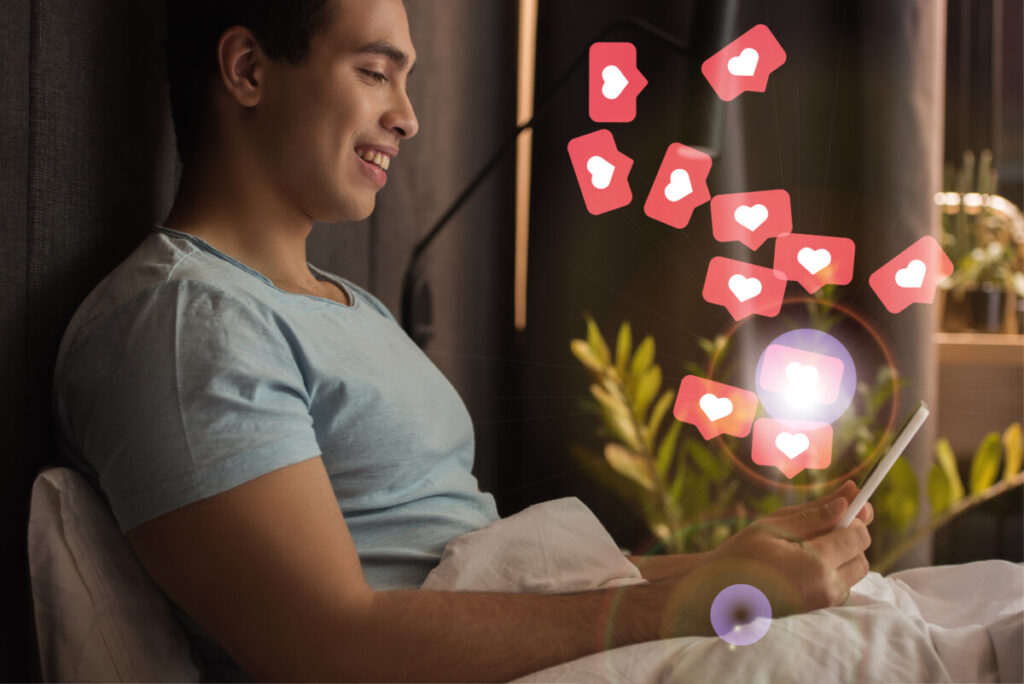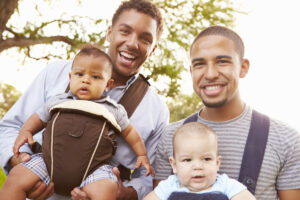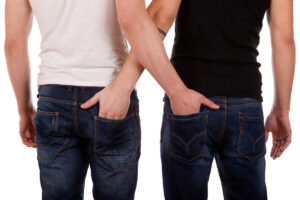The Greeks’ Eight Types of Love as Applied to Gay Men
As a long-term (29 years in 2021) gay men’s specialist psychotherapist, sex therapist, and life/career/relationship coach, I have a lot of clinical experience history to draw from to help new clients. Whenever we draw from history, we can find valuable resources from the past just waiting for us to discover. World history can be the same way. Recently, I was studying a classic structure from history and literature: the eight types of love, according to the ancient Greeks. I got to thinking: how can we take these types, so often discussed in a heterosexual (heterosexist?) context, and apply them to gay men? What could we learn from them, to make the lives of gay men (single or in relationships) better?
Let’s look at each of the eight types of love that the Greeks purported. By “mining” these historical concepts, I think we can find a guide for our perspectives on love today.
Examinations of these classic eight types of love are all over the Internet, but I was reviewing one such analysis that is available at FTD.com, here: https://www.ftd.com/blog/give/types-of-love.
They are:
-

Groups of gay men often experience Philia, a love that runs deep in friendships Philia – Affectionate Love – “a love that runs deep in true friendships”
As Applied to Gay Men:
This type of love is one that hopefully we all know well, but I’ve worked with clients who express a frustration that lack it. Whether it was a long time ago, as children, or teens with our high school group, or college, or in adulthood, ideally we can name some people (very often our gay male peers, but sometimes with female or straight allies) where we feel the close bonds of friendship. Casual terms like our “bff” or “homie” or “partner in crime” for partying around town come to mind, or even “brother from another mother.”
Many gay men I’ve worked with as clients, especially middle-aged or older guys, have sometimes said that they appreciate socializing mostly with non-sexual, non-romantic people in their lives as single men, versus emphasizing the “hunt” for finding a partner/spouse.
But when we lack this kind of love – when we have a feeling that we don’t really have a deep love in the friend sense, maybe because we’ve moved away and we don’t see old friends, or maybe because we just have not cultivated deeper friendships in our lives, it means we have some work to do. Developing a deep affectionate love in a friendship certainly takes time. It’s a phase that comes after a long time of getting to know someone, share experiences, disclose intimate information to them (and receive theirs back), and build a trust and affection that is not like that of having a partner, but a “best friend”.
Sometimes, in therapy or coaching, this kind of love needs to be a longer-term goal, beyond a shorter-term goal of just “getting out there” and socializing more, so that strangers can become acquaintances, and they can become friends, and they can become closer friends, where the Philia type of love can find a home between us.
-
 Pragma – Enduring Love – “mature love that develops over time”
Pragma – Enduring Love – “mature love that develops over time”
As Applied to Gay Men:
Some of my clients are in relationships where they have attained this type of love with their partner or husband. They often describe it in a very similar way, that their love has deepened and seasoned, like a wine that has aged into depth of flavor, just by being in a relationship for a long time. This can be with both monogamous and CNM (Consensual Non-Monogamous) relationships, and even be there if they don’t even live together, but have known each other a long time and lived through various developmental stages in life, but sharing their love for each other along the way.
This type of love, of knowing and trusting someone very profoundly, is often a goal of younger gay men I work with. They have seen this type of mature, long-term love flourish, perhaps with their grandparents, parents, older siblings, or just other gay men who are a bit older.
This kind of love often evokes someone to ask the couple, “Hey, what’s your secret?” and they get various answers about respect, honesty, sharing fun together, being able to work through challenges and differences, good health, and maybe good luck.
This type of love exists in the gay male communities of the world all over, and is sometimes depicted in movies like “The Birdcage” or “Longtime Companion”.
It can also prompt envy by other gay men, who are frustrated by the dating scene or who lack a partner at all, or one that fulfills them the way they’ve observed in others.
This type of love can be a certain romantic “life goal” for younger gay men, and it happens for some, and not for others. How much happens “to” us, versus how much we create this for own lives, is perhaps subject to discussion or debate. I think it’s a combination of both; you can just will or force it to happen, but you also need to do your part to cultivate the conditions, especially over the long term, where this kind of love can develop.
 Storge – Familiar Love – “flows between parents and children or childhood friends”
Storge – Familiar Love – “flows between parents and children or childhood friends”
As Applied to Gay Men:
For gay men who actually are parents, they would understand this type of love first hand. Many people, of any sexual orientation, who are parents describe the love for their children as profound, and very primal/instinctual. Most of the time, it works this way. However, many gay men know that in some situations, parents actually do not love their children. Some parents let their pathological “devotion” to religious or concepts make them capable of a sadistic cruelty to their gay sons (or other LGBT+ children) that leads them to kick them out of the house, neglect them, or in some tragic cases, literally torture and murder them (like some cases in the news in the last few years in the United States). Gay men live with the burden of knowing that parents do not always love their children, and this is a serious psychiatric pathology that runs in a range from anti-gay disapproval, to disgust, to violent destruction of their own children, which is something that most straight children (except the ones who are emotionally, physically, and/or sexually abused) don’t realize. It is a privilege for children to only experience their parents as reasonably loving and avoid first-hand experience of parental abuse or hatred.
But for the children or the parents who experience Storge, it can be an exquisite human experience, which is easy to understand why the Greeks identified and exalted this type of love. The other part of this meaning, “love between childhood friends”, can also hold a special place in our hearts for many years to come, and can give us fond memories, whether we lost touch with those childhood friends, or kept them for a lifetime.
If you’re a gay man who enjoys Storge in his life, cherish that. However, if you are a gay man who is estranged from his parents from a lack of Storge, or lost or never had this type of affection among childhood friends, see if you can take a self-empowered approach (one of my favorite concepts in my practice, such as in my book, Self-Empowerment: Have the Life You Want!) and see if you can enact behaviors to cultivate a type of Storge in your life.
For example, if you don’t have parents, because you’re either estranged or because they have passed away, try to cultivate maternal- or paternal-like friendship relationships in your life. This could be with co-workers, neighbors, mentors, or older people that you meet through any social contact (clubs, organizations, community events). Many people describe how their relationships with other, older individuals can be “like a mother (or father) to me.”
Or, if you don’t have children, see if there is a way that might support younger people (I wrote an article on this years ago, “How Gay Men Can Satisfy the Paternal Instinct”, here).
Just because you don’t have actual parents or actual children doesn’t mean that you are cut off from experiencing Storge in your life.
-
 Eros – Romantic Love – “personal infatuation and physical pleasure”
Eros – Romantic Love – “personal infatuation and physical pleasure”
As Applied to Gay Men:
I can hear it now; I think many gay men would react to a mention of this type of love pretty enthusiastically! Gay men’s enthusiasm about sex, whether it’s with a partner, dating, a hookup through an app, bar/club, or cruising, or just any opportunity to “appreciate” the erotic energy of another guy, is well known (but let’s be fair: I don’t think gay men are necessarily any “more” sexual than straight people, but part of homophobia can be that we are labeled inordinately focused on sex).
But the revenues from porn, apps, bars/clubs, bath houses, sex clubs, and other commercialized opportunities around gay men and Eros show that this type of love is an important force in our gay world.
Eros in the life of a gay man can be an important, celebratory element of our quality of life. Despite the rampant disparaging from bigoted homophobes, who want to “slut-shame” gay men, label us “sex addicts” (a widely discredited concept from any legitimate sex therapist), or undermine the legitimacy of our sexual expression (such as through disparities in age of consent laws worldwide, lack of legal rights, discrimination, oppression and hate crimes, and even legalized government execution of gay men in some countries of the world (usually countries with Muslim governments)), Eros often thrives in the lives of gay men worldwide, for just like food, water, basic health, and protection from the elements, is an important part of living that needs recognition, validation, protection, and expression.
For some gay men, their celebration of Eros is robust. They enjoy sex of the type and frequency they want. For others, they suffer with a lack of opportunity for the expression of Eros in their lives. This lack can be the purview of therapy, coaching, and sex therapy, to convert from one state of being (a lack of Eros), to another state (where Eros is enjoyed in the way that feels right for you, in your individual value system). I work with many gay men in my practice on how to identify, and then implement, living by the value system that works for you in relation Eros, or any of these eight types of love.
 Ludus – Playful Love – “flirting and beginning stages of intimate love”
Ludus – Playful Love – “flirting and beginning stages of intimate love”
As Applied to Gay Men:
Similar to Eros, gay men perhaps especially can be masters of flirting and the beginning stages of intimate love. Cruising can be seen this way. Sending a guy a message on a gay website or app can be this flirtation. Approaching a gay in a bar or club can be. Buying a guy a drink, dancing with him, chatting him up at the gym or a park, making eye contact, inviting him to a meal, asking him questions in the setting you’re in (such as standing in line to check out at a store), can all be ways of flirting and expressing that exciting initial attraction that can feel a little scary, playful, and full of potential of where those initial seconds of interaction might lead – in some cases, to sharing a life together for many years.
Gay men who have been partnered or married for a long time can probably remember when Ludus was first introduced into their lives with their partner. I remember some (not all) of the initial conversation that I had with my now-husband of 19 years (in 2021) at a Sunday T-Dance at a Cinco de Mayo club event. We weren’t, understandably, in love yet, but those initial moments of attraction and social goodwill were part of the initial Ludus that evolved into other types of love later.
The fun part of Ludus is that it can happen spontaneously, anywhere, anytime, with even the most chance social encounter. I always advise my gay male clients in search of a partner to “put yourself out there” into being active in the community, to be “interested, and interesting”, because you can’t create that initial moment – millisecond, really – of Ludus without being out in the world where gay men are – which is really anywhere.
 Mania – Obsessive Love – “obsessiveness or madness over a love partner”
Mania – Obsessive Love – “obsessiveness or madness over a love partner”
As Applied to Gay Men:
I conduct a good deal of couples therapy or relationship coaching over many years (29 years in 2021) for gay male couples in my career. This type of love, Mania, is a fairly frequent topic, because it’s difficult to have a relationship with someone without obsessiveness, jealousy, or some kind of irrational or misguided thinking and behavior being at least a risk, if not a very present element, in that relationship. It’s just a human vulnerability that we all have, in varying degrees.
Many poets and authors have said that “rational thinking” and “love” don’t always blend in ideal ways. Part of my work with gay male couples in therapy or coaching can be identifying where the Mania is, in our thoughts or behaviors, and identifying alternatives that might reduce drama, conflict, and heartache.
We can also experience Mania with unrequited love, which is a difficult phenomenon (the musical, “Passion”, by the late, great, gay composer, Stephen Sondheim, explores this idea very deeply and poignantly). Unfortunately, for a relationship to exist and be happy/stable, there needs to a “unanimous vote” between or among the two (or more) partners that want that relationship to be, and thrive.
Mania can be the risk of passion. We don’t want to be stoic or “removed” in love, but we also want to employ what therapists call “affect regulation,” which is fancy term for “get a grip on yourself, gurl!” We can experience our emotions, but if our emotions (especially negative ones like insecurity, jealousy, or anger) get the best of us, we need to cultivate ways to manage what we feel, with what we think, and how to take care of ourselves and others in emotionally mature ways.
 Philautia – Self Love – “having a healthy self-compassion love towards one’s self”
Philautia – Self Love – “having a healthy self-compassion love towards one’s self”
As Applied to Gay Men:
Also in my work as a gay men’s specialist therapist and coach, I am frequently (daily!) working with gay men on improving their self-esteem, self-concept, and self-efficacy (all of those good “self” concepts that are often the work of mental health and social support professionals).
When I work with gay men, we often ask, collaboratively, how can we cultivate and improve Philautia, or self-love. As gay men, many (most?) of us have at least in part internalized the negative messages of a generally homophobic society, either through government policy, the news, religious influences, peer stress and bullying, or hypercritical parents. When you basically grow up with these, it can take a lot of work to un-do that damage to our psyches and restore Philautia to love and appreciate ourselves as we are (the late New Age author and speaker, Louise L. Hay, was a master at discussing and inspiring the concept of Loving the Self).
Self-love doesn’t mean a self-centered, arrogant Narcissism that puts our needs and desires over others in ways that run roughshod over the rights and dignity of others. It means more that we take a humanistic approach to ourselves, to love ourselves as we love others, and that we live in a compassion for self and others. We might take responsibility for things that seem to be mistakes in judgement, but we don’t extend this into shame or self-hate.
The cultivation of Philautia often involves realizing that the bigoted antipathy that was lobbed our way by homophobic others, sometimes in large numbers, nearly constantly, and in a grand magnitude, was about “their problem” with intolerance, and had nothing to do with us. We were fine all along. It is very often the adult task of gay men to meditate on this concept, and to put the blame where it belongs, not on us for being gay, but on them for being intolerant, hateful, oppressive, or even murderous. Political or ethnic conflict and strife in many nations of the world would be another example of bigotry, as would racial or gender bigotry. While the responsibility lies with the perpetrators of hate, we as gender and sexual minorities in the LGBT+ community worldwide need to cognitively reframe this from any internalization of this, which leads to self-loathing, and instead cultivate the Philautia that allows us self-compassion, self-appreciation, and self-love, that allow us to thrive in this lifetime, and may the “critics” be damned.
 Agape – Selfless Love – “an empathic attitude of love for everyone and anyone”
Agape – Selfless Love – “an empathic attitude of love for everyone and anyone”
As Applied to Gay Men:
Many historical world figures have been examples of Agape, personalities that seem to radiate “love for everybody”. While this can be a bullshit public relations stunt and a smokescreen for those who were later revealed to be greedy, narcissistic people, especially in such controversial figures such as Mother Teresa or Joel Osteen, other public figures, contemporaries or historically, seem to inspire us with their take on things. Poet Maya Angelou, singer/songwriter/entrepreneur/philanthropist Dolly Parton, actress Betty White, naturist Jane Goodall are among the public figures whom many would label inspirational examples of being especially humanistic, generous examples of Agape.
Society in general has oppressed the recognition of gay men as examples of Agape. Political leader Harvey Milk (who was murdered as mayor of San Francisco by a fellow City Council member who was convicted of murder but then got an egregiously light sentence due to blaming his murderous behavior on consuming too many Twinkie snack cakes) comes close. Perhaps this concept is something that gay men aspire to on a less public, individual basis. I think gay men often aspire to embody Agape, as a counter-force to the bigotry and antipathy so many of us are exposed to, to a large degree and over a sustained period of time.
Embracing Agape toward a world that has only recently been relatively more “accepting” overall but can still have parts of it where gay men are literally subject to state-sanctioned murdered for who they are is difficult. And yet there are many social, philosophical, and spiritual traditions that would say that because there is hate in the world is exactly why we need to embrace and cultivate Agape in ourselves as best we can. This is the humanistic challenge for all of us, but especially for gay men as an oppressed sexual minority, worldwide.
In my work as a therapist and coach, I have learned through work with thousands of gay men, as individuals and couples, that we thrive in our quality of life by embracing ideas, concepts, methodologies, strategies, and cognitive-behavioral strategies that aid us in so many different life situations. We cultivate and build a good quality of life by learning as much wisdom as we can about how to “get by” in this lifetime, while we have one.
By learning many positive concepts, such as these Greek Eight Types of Love, we learn a little more about how we can steer our own thinking (and subsequent behavior) toward living a “higher order” of life. This can bring happiness, contentment, peace, and wisdom. We don’t have to be perfect at identifying, understanding, and implementing concepts like these, but we can try, and in our efforts, we evolve toward being the people, and having the world, that we want.

For help in identifying and implementing positive ways of thinking and behaving that might raise your quality of life, consider therapy (for California residents, where I am licensed) or coaching. These services are distinct, but both are popular ways that people come to terms with life’s challenges and evolve into a subjectively better state of functioning. I’m happy to help. For more information, or to schedule an appointment, call/text 310-339-5778, or email Ken@GayTherapyLA.com.



 Pragma – Enduring Love – “mature love that develops over time”
Pragma – Enduring Love – “mature love that develops over time” Storge – Familiar Love – “flows between parents and children or childhood friends”
Storge – Familiar Love – “flows between parents and children or childhood friends” Eros – Romantic Love – “personal infatuation and physical pleasure”
Eros – Romantic Love – “personal infatuation and physical pleasure” Ludus – Playful Love – “flirting and beginning stages of intimate love”
Ludus – Playful Love – “flirting and beginning stages of intimate love” Mania – Obsessive Love – “obsessiveness or madness over a love partner”
Mania – Obsessive Love – “obsessiveness or madness over a love partner” Philautia – Self Love – “having a healthy self-compassion love towards one’s self”
Philautia – Self Love – “having a healthy self-compassion love towards one’s self” Agape – Selfless Love – “an empathic attitude of love for everyone and anyone”
Agape – Selfless Love – “an empathic attitude of love for everyone and anyone”